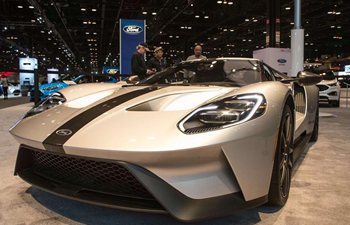NEW YORK, Feb. 8 (Xinhua) -- As part of his "America First" plan, U.S. President Donald Trump has imposed import tariffs on solar panels and washing machines. Experts, however, regard it as a "risky measure" which will have a negative impact on consumers.
Under Section 201 of the U.S. Trade Act of 1974, the Trump administration last month approved tariffs of 20 percent on the first 1.2 million washers and 50 percent of all subsequent imported washers in the following two years. A 30 percent tariff will be imposed on solar panel components, with the rate declining over four years.
"Free trade and open markets need the existing liberal and multi-lateral trade regulations," the German Electrical and Electronic Manufacturers' Association (ZVEI) told Xinhua in a recent interview via email.
"Trying to solve trade disputes beyond this institutional setting is risky," it said.
Besides the expected price change, the tariffs are likely to trigger other tremors in a closely connected global market.
"Mutual retaliatory measures could start a downward spiral, which will only know losers in the end," ZVEI told Xinhua.
The German organization said too that "neither industry nor consumer would benefit."
Trade barriers will lead to rising prices for consumers and innovation will be hurt as a result of sapped international competition, ZVEI explained.
Petros Mavroidis, an international trade law professor at U.S. Columbia University, agreed.
"Protectionism leads to more demand for protectionism, and provides companies with the wrong incentives -- to demand protections instead of improving their products," Mavroidis told U.S. magazine Consumer Reports.
Tariffs are normally imposed due to unfair trade practices by other countries, rather than complaints from U.S. manufacturers, according to Consumer Reports.
American manufacturers like Whirlpool, which have been complaining about foreign competition for years, supported the action. Foreign brands like South Korea's LG have announced plans to raise prices for their washing machines in the American market.
Hye Min Song, consumer appliances industry manager at Euromonitor International, a market research provider, said "the most impact will go to South Korean manufacturers such as Samsung Corp or LG Corp, whose washing machines will now be less attractive to U.S. consumers" as "they both have recently increased their market share significantly within U.S."
Samsung has started production at its first U.S. plant in the U.S. state of South Carolina. LG is building a manufacturing plant in Tennessee.
According to the trade group of the Association of Home Appliance Manufacturers, November's shipments of foreign-made washers to the United States more than doubled from a year earlier. But December data remained consistent, seeing an 8.8 percent decrease from December 2016.
The Trump administration's move against imported solar components has split the solar panel industry with local manufacturers favoring the tariffs as a necessary step to save domestic subsidiary companies, while installers oppose them as job-killers with the move is set to raise costs.
It was predicted by the head of the Solar Energy Industries Association that the tariffs could lead to the loss of roughly 23,000 American jobs this year.













